ONE WORLD Magazine
Sunday, June 26th, 2016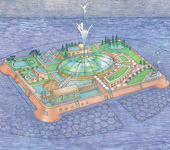 Journalist Hidde Jansen writes: Forget Mars, deserts or kilometer high apartment buildings, in the future we live at sea. If you ask the Dutch pioneers Frits Schoute and Rutger de Graaf, floating cities will be reality within twenty years. Read the full article (in Dutch) at www.oneworld.nl/water/klimaat-toekomst/kunnen-we-wonen-op-zee Click on “read more” for the English translation read more »
Journalist Hidde Jansen writes: Forget Mars, deserts or kilometer high apartment buildings, in the future we live at sea. If you ask the Dutch pioneers Frits Schoute and Rutger de Graaf, floating cities will be reality within twenty years. Read the full article (in Dutch) at www.oneworld.nl/water/klimaat-toekomst/kunnen-we-wonen-op-zee Click on “read more” for the English translation read more »
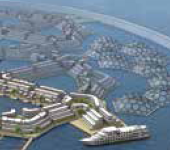 Een bijlage bij de Belgische kranten De Standaard of De Morgen kan het worden, de bachelorsproef van studentes Yolanthe van Endert en Maria Walgraeve. Ter afronding van hun Professionele Bachelor bij Thomas More schreven zij een reeks informatieve artikelen over wonen op water, over cohousing, over mobiele wooneenheden, over lintbebouwing etcetera. Het interview met Frits Schoute is hieronder al te lezen.
Een bijlage bij de Belgische kranten De Standaard of De Morgen kan het worden, de bachelorsproef van studentes Yolanthe van Endert en Maria Walgraeve. Ter afronding van hun Professionele Bachelor bij Thomas More schreven zij een reeks informatieve artikelen over wonen op water, over cohousing, over mobiele wooneenheden, over lintbebouwing etcetera. Het interview met Frits Schoute is hieronder al te lezen. 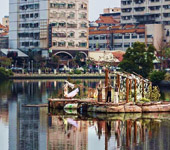
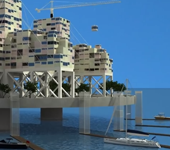 A fresh start on a floating city could be just a few years away, according to the
A fresh start on a floating city could be just a few years away, according to the 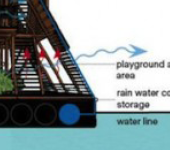 Thomas Raub en Oscar Schoen van de hoogste klas van het Utrechts Stedelijk Gymnasium schreven een uitstekend profielwerkstuk ‘
Thomas Raub en Oscar Schoen van de hoogste klas van het Utrechts Stedelijk Gymnasium schreven een uitstekend profielwerkstuk ‘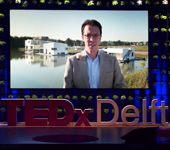 “We are running out of land, so let’s build on the water”. This was the title of a well presented talk on October 4th 2013 at TEDxDelft. Let Rutger de Graaf convince you by some impressive numbers. He presents a big solution (in line with the Ecoboot philosophy) to a big problem.
“We are running out of land, so let’s build on the water”. This was the title of a well presented talk on October 4th 2013 at TEDxDelft. Let Rutger de Graaf convince you by some impressive numbers. He presents a big solution (in line with the Ecoboot philosophy) to a big problem. 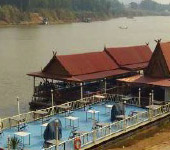 Het Essay in De Ingenieur van 12 juli 2013 is een pleidooi voor het redden van een waardevolle traditie in Thailand. Thailand kent op het platteland een traditie van drijvende huizen die nu verloren dreigt te gaan, terwijl het land regelmatig overstroomt. Waterarchitect Bart van Bueren pleit voor een herstel van het oude volksgebruik, dat volgens hem bij uitstek is aangepast aan weersextremen.
Het Essay in De Ingenieur van 12 juli 2013 is een pleidooi voor het redden van een waardevolle traditie in Thailand. Thailand kent op het platteland een traditie van drijvende huizen die nu verloren dreigt te gaan, terwijl het land regelmatig overstroomt. Waterarchitect Bart van Bueren pleit voor een herstel van het oude volksgebruik, dat volgens hem bij uitstek is aangepast aan weersextremen. 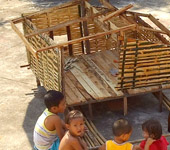 Thailand has a long history with living in flood plains, and has many vernacular solutions to protect against flooding. Yet, in recent years Thailand got devastated by floods. This workshop will analyze the traditional measures against flooding, such as floating fishermen villages and stilt homes. Gained insights will be used as a case study for a small village in central Thailand. On urban scale we will study how water communities can connect to the land, on building scale we will analyze floating buildings and on detail scale we’ll try to make a small raft like floating body.
Thailand has a long history with living in flood plains, and has many vernacular solutions to protect against flooding. Yet, in recent years Thailand got devastated by floods. This workshop will analyze the traditional measures against flooding, such as floating fishermen villages and stilt homes. Gained insights will be used as a case study for a small village in central Thailand. On urban scale we will study how water communities can connect to the land, on building scale we will analyze floating buildings and on detail scale we’ll try to make a small raft like floating body.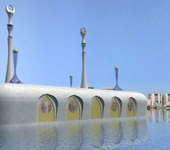 Many spectacular plans do exist for floating buildings. Prof. Chang-Ho Moon of the Kunsan National University in Korea made it more concrete by studying 3 realized and 3 planned projects in terms of sustainability. Below you can download his study which appeared in the Journal of Navigation and Port Research, International Edition.
Many spectacular plans do exist for floating buildings. Prof. Chang-Ho Moon of the Kunsan National University in Korea made it more concrete by studying 3 realized and 3 planned projects in terms of sustainability. Below you can download his study which appeared in the Journal of Navigation and Port Research, International Edition. 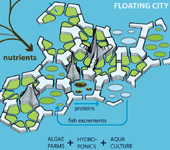 To avoid severe shortages in 2050, existing metropolises must transform into flood proof ecocities. Moreover parts of these cities + food production must be located on the water. These solutions were presented by Ruger de Graaf in his Inaugural Lecture on the Blue Revolution. Below (following read more) you will find a summary + a link to his book presented after this lecture.
To avoid severe shortages in 2050, existing metropolises must transform into flood proof ecocities. Moreover parts of these cities + food production must be located on the water. These solutions were presented by Ruger de Graaf in his Inaugural Lecture on the Blue Revolution. Below (following read more) you will find a summary + a link to his book presented after this lecture.